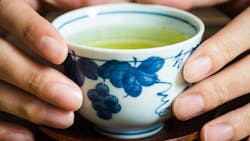Green tea-based adhesive film
A recent study published in the journal ACS Omega shows promise for a green tea-based mucoadhesive film being able to treat oral inflammation. Researchers at the Tokyo University of Science (TUS) have developed an antioxidant-rich film using xyloglucan (Xylo) and catechins from green tea extracts that can be directly applied to affected areas of the mouth and provide localized relief.1
Oral mucositis is a common and painful side effect of cancer treatment that results from damage to rapidly dividing mucosal cells. Roughly 30-40% of patients undergoing chemotherapy and radiation experience this uncomfortable condition, many of whom have difficulty eating and sleeping. To alleviate this pain, a research team led by Professor Takehisa Hanawa investigated the healing properties of green tea, a natural source of antioxidants and anti-inflammatory properties.1
The science behind this innovation
To develop their adhesive film, researchers combined Xylo, a water-soluble polymer extracted from tamarind seeds, with green tea extract-which contains over 75% catechins. Green tea catechins protect cells from oxidative stress-and these powerful compounds neutralize the harmful free radicals generated during cancer treatment.1
And since Xylo is a natural gelling agent (often used as a food thickener), the structure of the film solution is thin, flexible, and closely resembles the mucin network in the mouth. Its mucoadhesive properties help it adhere to the inside of the mouth to deliver active ingredients, like medications. Overall, this experimental film is a "convenient, inexpensive, and user-friendly alternative to mucoadhesive tablets, which often have limited usability."1
Initial tests and development
First, Professor Hanawa's team developed two types of films: hydrogels (which were prepared by drying the Xylo and green tea extract solutions at 4 °C/39.2 °F for 24 hours) and xerogels (which were dried for one week). The xerogels matured into firmer, drier films while the hydrogels weakened and liquified at skin surface temperatures.1
The adhesive strength of these films was then tested by pressing them onto mucin disks coated with artificial saliva and measuring the force required to detach them. These disks were meant to simulate natural oral conditions. Results yielded detachment forces that either matched or exceeded those of over-the-counter products.1
The future of oral mucositis treatment
In a recent press release, Professor Hanawa stated: "Our goal was to create a formulation for oral mucositis that patients could use easily and comfortably, helping to prevent the decline in quality of life and difficulties with eating caused by cancer treatments."1
New innovations are exciting, and the overwhelming promise of this experimental film may play a pivotal role in the future of oral mucositis treatment. Researchers are now dedicated to perfecting film's design and evaluating its safety and efficacy through further experimentation.
Reference
-
Green tea-based adhesive films show promise as a novel treatment for oral mucositis. Tokyo University of Science. January 22, 2025. https://www.tus.ac.jp/en/mediarelations/archive/20250121_5268.html
About the Author

Sarah Butkovic, MA, BA
Sarah Butkovic, MA, BA, is an Associate Editor at Endeavor Business Media, where she works on creating and editing engaging and informative content for today's leading online dentistry publications. She holds a Master's English Language and Literature from Loyola University Chicago and is passionate about producing high-quality content that educates, inspires, and connects with readers.

